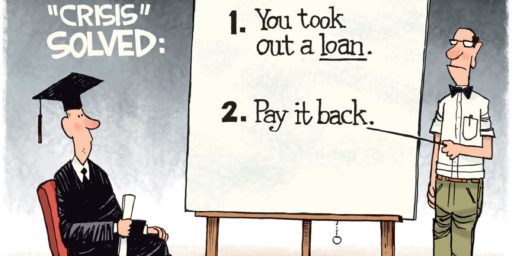The 53%
Thinking about some of the claims of the 53%.
 It strikes me that the real discussion that should emerge as a result of the 53% v. the 99% should have the following three components:
It strikes me that the real discussion that should emerge as a result of the 53% v. the 99% should have the following three components:
1) To what degree does hard work equal success? (the underlying argument of the 53%)
2) To what degree are the extremely wealthy (especially those in the finance industry) especially privileged by the existing political and economic system (the underlying claim of the 99%).
3) The degree to which there is actually an important nexus where hard work intersects with societal opportunities (which includes government policy). This is the debate that we largely don’t want to have—especially the 53 percenters.
Clearly, hard work is important–indeed, it is essential to success. However, the obvious is worth noting: it does not always result in success (and, further, not all of us have the same opportunities to successfully deploy our hard work the way we would like–a topic I hope to return to in another post). Likewise, it is is difficult to ignore the fact that the recent bailouts were advantageous to the financial sector and, further, that if one’s income is based on capital gains, one gets an advantage in terms of paying taxes. Both of these observations, no doubt, form the basis for a lot of ongoing debate. The third item, needs more attention, especially as it related to the first because it gets to fundamental questions about the general role of government in our society (and hence fiscal policy). Also, in looking at the 53% Tumblr (or, indeed, listening to many GOP politicians, e.g., here), it just seems like a lot of denial is going on. If the 53% response is all supposed to be part of a big debate about the role of government and government policy in the context of helping (or not) the success of said hard work, I think some of these missives seem not to understand their own arguments, which feeds into item #3 above.
For example, a lot of them talk about having served in the armed services, which is a government job funded by taxpayers (and, indeed, is a major slice of the budget). Further, in many cases one gets enhanced educational opportunities because of being in the military or as a result of veterans’ benefits. Whatever else one can say, the military isn’t about the free market and is very much about government policy.
Many also talk about their educations. How many went to public K-12 and public universities? My guess is: most of them. A lot of them mention student loans (which is a government program to help subsidize higher education). Again, public education and subsidized loans are not the free market and may of us would have been in big trouble if we had to pay true market rates for education or had to secure student loans without the government being involved.
There is also the fact that in reading some of them, it is entirely likely that a lot of these people may, in fact, be part of the 47% who end up paying no federal income tax (i.e., they may be the middle to lower middle class with enough children or other deductions to have a net income liability of zero—like one guy who notes he is unemployed, or the other who cites his hourly wages). I continue to think that a large number of people do not understand the way our tax system works (and certainly do not understand the difference between payroll taxes and income taxes).
I think it would be helpful if we would all acknowledge that even when we work hard, we don’t do it in a vacuum and that we have all benefited from a variety of public policies. This is not to say that these policies are always ideal or efficient, but we can’t have a debate about things like taxes, spending, and regulation unless we start from a place of reality (and that applies to the pie in the sky claims of many of the 99% types as well).
All of this is part of a broader debate that is continually recurring over taxing, spending, and the general role of government: what should we spend on and whom does it benefit? These are fair questions—although my basic point here is that it would be quite helpful if we would all be honest about what benefits we did, or did not receive, in our own lifetimes. And yes, we also have to look to our own inputs (i.e., hard work matters).
Note: this post is reflective of an honest attempt to get to what I think are fundamental philosophical issues that confront the US both now and going forward. I am increasingly of the opinion that a major part of the problem in the US is that most of us don’t want to admit the degree to which we are not 100% responsible for our own circumstances and that, indeed, part of what we all need to assess is the degree to which a) we owe debts to others (including collective actions by government), and b) the degree to which some us are simply more capable (due to natural talents, circumstances, or both) at being successful than others. More to come on this subject, no doubt.






Well said.
Excellent post…which of course means I agree with you…including:
Meh.
Luck is the biggest factor in getting rich, whether its being born into the right family or applying to the right company at the right time.
http://www.businessinsider.com/what-wall-street-protesters-are-so-angry-about-2011-10?op=1
Those charts pretty much sum up the “99%” case, in my view.
The trends are bad for the poor, the middle class and most of the upper-middle class. There is indeed a lot of denial about this, particularly but certainly not exclusively on the Right.
While I can’t claim to speak for all liberals, the basic conclusion I’ve come to is that hard work and talent are only two of many possible components of success/failure in contemporary America. Others include: luck, inheritance/privilege*, racism, governmental distortion of the market (barriers to entry, regulatory capture, etc.), and of course macroeconomic trends that simply have nothing to do with your individual circumstances (this could go under luck I guess), like a small group of people blowing up the world’s financial system. This all muddies up our (fantastical) meritocracy.
These things can be mitigated, IMO, via government. An imperfect solution, to be sure, but better than the alternative. Thus, I’m a liberal. There are periods in our history during which I’d have been a liberal Republican. This is not one of those times.
@ponce:
I wasn’t talking there about simply being rich.
” I continue to think that a large number of people do not understand the way our tax system works ”
Amen. I used to do taxes for small businesses. None paid the highest rate. Aside from lawyers and doctors none were even close to the top bracket. Career government employees earn more then most small business owners.
Most people do not realize how generous the tax code is to parents. The addition of the child tax credit to personal exemptions mean someone can earn a middle class income and pay no income tax. This and the way social security is treated is why 47% pay no income tax. If someone wants more people to pay income tax they should say whether they want to tax parents and/or seniors more.
I’ve noticed this a lot in complaints from people being taxed too much. Also, often times the taxes that I see complained about are 1) not federal taxes (like property taxes or sales tax), but assumed anyway to be federal taxes 2) large in number (but not necessarily as a percentage of income) because of state/local opposition to income taxes (also, hence “fees” rather than taxes) and 3) hit them disproportionately hard because they are not rich/upper-middle class and don’t realize that state/local taxes are generally regressive.
What are the forms of success where luck doesn’t play a part?
b) the degree to which some us are simply more capable (due to natural talents, circumstances, or both) at being successful than others.
I think we all know that natural talents/inclinations play a role. How much of one is probably impossible to determine, but the fact is that some people are good at X, others aren’t, and sometimes X ends up paying really well. How do we handle people who aren’t good at X? How do we handle people who aren’t good at anything economically valuable (this reminds me of a line from Falling Down “They said I wasn’t Economically Viable!”)?
I think we’ve ruled out the most extreme possibilies: just kill ’em/let ’em starve and pay everyone the same (communism). We seem to be having a long-term (multi-generational) debate over the options that lie between.
Speaking of multi-generational, that brings up another issue I think feeds into this: aging, and how we handle it. SS and Medicare are inter-generational transfers. I’m ok w/them because most young healthy people end up old unhealthy people. Others disagree.
@ponce: Well, now you have gone from luck being the “biggest part” to “a part.”
Yes, luck plays a part–especially if broadly defined as unearned advantages (like the family one is born into).
And the poor work a lot harder than the rich.
It also seems to me that there needs to be a serious discussion of what it means for something to be intentional versus institutional. We’re fast to recognize and condemn bias when it’s conducted by individuals, but when it comes to institutions people are very reluctant to admit the possibility of bias (unless they think the system is operating against them). And even in the cases where someone does see institutional bias, they usual look for the individual responsible rather than recognizing that sometimes the bias happens through no single individual’s fault.
But of course, if we recognize the bias inherent in the system (versus the retreat to “dumb luck and pull yourself back up”) then we have to ask ourselves to what degree do we each benefit from that bias. That’s the danger of looking for/into an abyss.
I think luck is a factor, but there has also been a shift in the nature of American capitalism.
Bankers’ salaries vs. everyone else’s
Basically some bellwether commentators started warning on “excess financialization” ten years ago. OWS seems to be popular response, once the dust settles.
@Rob in CT:
A lot of good charts at your link, thanks. One more I liked:
Lawrence Lessig at Occupy Wall Street
(I guess what I’m saying Steven is that “the 53%” want to move the focus from the very specific benefits the 1% have enjoyed, to make it a general discussion of work and reward. Perhaps they are genuine, but it is handy for the bankers. Removes them from the spotlight, and all that.)
I don’t expect any such bridge between OWS and the TP. The common ground between the two is simply too narrow.
Ideally, sure. But in reality? I don’t think so.
people on the left and people on the right look at the crony capitalism of this system and they look at the way in which money from Wall Street bought the regulatory infrastructure that led to the collapse of 2008. And even worse, after the collapse of 2008, the same money blocked any reform of this regulatory infrastructure.
Rightwingers think it’s the fault of Democrats. You see it on the ‘net, you hear it in person (or at least I do). The crash of ’08 is Jimmie Carter’s fault, dontchaknow (the CRA). My parents believe this, completely. And mumble mumble Barney Frank Chris Dodd Jessie Jackson!
We have made attempts to curtail the ability of big money to buy politicians. These attempts have failed. Money is speech, my friend.
So yeah, I think there is a lot wrong with our system and I agree that both Left and Right are reacting with anger to the same root problem, but I also think there is a snowball’s chance in hell that they will come together to deal with it. Not just because of spiteful tribal politics, either. Their reform efforts would be fundamentally different. The Conservative answer is to defund & diminsh government itself. The Lefty answer is to enact laws/regulations (which then get struck down).
Ok, I’m sad now.
@Rob in CT: Here’s the thing that depresses me about regulations: It seems they never stick to their targets. Target the banks and swipe fees, and the banks will just impose other fees on customers and say, “You don’t like it? Talk to Dick Durbin.” I don’t know how regulations could be stricter or more able to be stuck to their targets, but right now they mean nothing and can basically be brushed aside in ways that will just make people madder at government.
@Fargus:
I’m pretty meh about that particular regulation, but I really haven’t read up on it much.
The benefit of regulating those fees was, as I understand it (from very limited reading), transparency. Not to save customers money. The banks are going to make money somehow. They were apparently charging nutty fees that were hidden from customers (b/c they were levied on the merchants). They were likely passed on to customers anyway. Now it will be out in the open (partly).
edit: I’d expect the new reg was heavily lobbied for by the merchants who were being subjected to the high fees (which, in turn, strongly suggests that they were having trouble passing on the fees to customers and wanted to shift the costs).
@Rob in CT:
I get that and agree, as far as it goes. But part of the point is not just that the fees were hidden, but that they were extortionate, and not really representative of the actual marginal cost of processing a debit card swipe. But since Visa and Mastercard are a duopoly, they can charge basically whatever they want.
But regardless, that was just an example. The point here is that regulations should be made to hit their targets. If the banks are charging extortionate fees for a service, and those fees are to be targeted, they shouldn’t be able to make it up with fees elsewhere. It seems that their primary consideration is that their profit not go down one cent, their executive pay not go down one cent, and then after that they’ll process what the business actually does.
edit: I’ve seen it alleged that merchants just wanted to lower the swipe fees and then leave their prices at the same level so that they could reap a windfall. Makes sense, and either way, it’s just the consumers getting hosed.
@Fargus:
It seems we’ve gotten away from breaking up companies that get too big (big enough to have monopoly power, or thereabouts). I think this is a bad thing. It goes hand in hand with “too big to fail.” If it’s too big to fail, it’s too damn big.
The point isn’t to target a bank’s profits or executive compensation (either or both of which might be outrageous, but government isn’t going to effectively & justly deal with that). The point is to set up the rules such that those profits & comp can’t get out of whack, via competition. The duopoly is the problem here. Failing to address that means endless flailing w/o success.
This gets harder when you have natural monopolies. But that’s another discussion.
@Rob in CT:
I agree completely. It seems that banks and financial institutions aren’t really operating in the “free market” anymore. That is, I’ve seen no compelling evidence that there’s any kind of competition going on and pushing the costs of their services down. Rather, there’s upward pressure on executive pay going on across the sector that pushes the costs of the services of financial firms inexorably up. But what value is being provided for that ever increasing amount of money? Beats me.
@mattb:
I just had a Monty Python flashback:
“The bias inherent in the system!The bias inherent in the system!”
Isn’t the question more, what percentage of success can be attributed to luck? Sometimes I get the feeling people think its binary – being successful is either 100% luck, or 0% luck.
I suspect luck is what is called in math a necessary but not sufficient condition (ie, being born with a terminal disease is going to make success hard, so will spending a million dollar inheritance the day you get it on booze and fast cars). The self-proclaimed 99’ers focus on the necessary, the self-proclaimed 53’ers on the not-sufficient … and I suspect most people believe success is a mixture of luck and effort.
ACTUALLY, YOU’RE THE 47%
If these “99%” (actually less than 1%) want to really help try these constructive ideas instead of having a big drug party, walking up and down the streets, begging for someone to pay off their graduate school loans, and creating a big mess for the tax payers to clean up; try one or more of these:
1- Go to a local school: be a mentor or tutor, 2- Paint, caulk lower income houses, 3- Volunteer at a homeless shelter, 4- Adopt a pet, 5- Rake leaves, clean up the yards of older people, 6- Organize a Halloween block party for kids: businesses will donate candy and prizes. Put those Halloween costumes to some use! 7- Get involved in a local church, 8- Organize a job fair: this was done at a local church by two people who were unemployed, resulting in a lot of job placements, even for the two who organized it! Prayers answered!, 9- Work with neighborhood patrol groups to monitor and report crimes, 10- Teach adult literacy: put those degrees to some real use.
While these may not seem glamorous or exciting, at least you would be actually helping people instead of sitting around a park surfing the net all day.
So, let’s bring the bus to basic training down to Wall Street and see how many of those claiming there is a societal obligation will take the ride for the common defense. Or is the obligation only on those with cash and none for those who enjoy the benefits of a successful economy protected by a strong national defense?
@JKB:
Sorry, the military can’t’ take them.
And yes, that is a jobs story.
Your framing of the underlying argument of the 53% as “Hard Work equals Success” is incorrect.
It is more correct to say that the underlying argument of the 53% is: A person’s success, or their failure for that matter, is their own responsibility, and not the responsibility of anyone else. And not Wall Street’s responsibility, either.
They may give examples of how they achieved success by relying upon themselves or their own families, but the examples just show that you CAN do it through self-reliance. The ARGUMENT is that either way, it’s YOUR OWN responsibility.